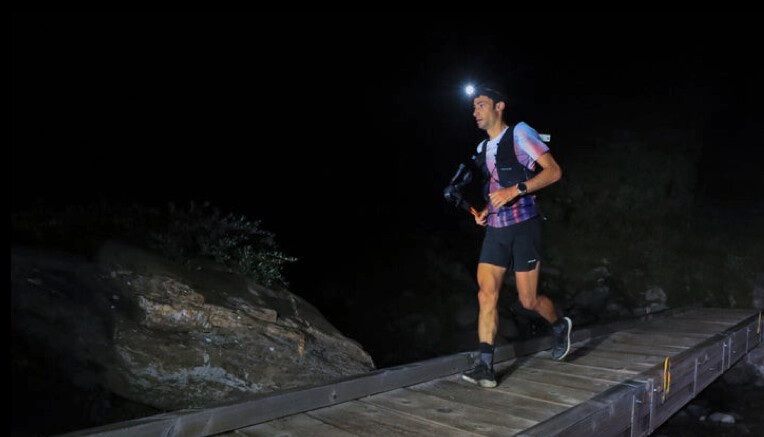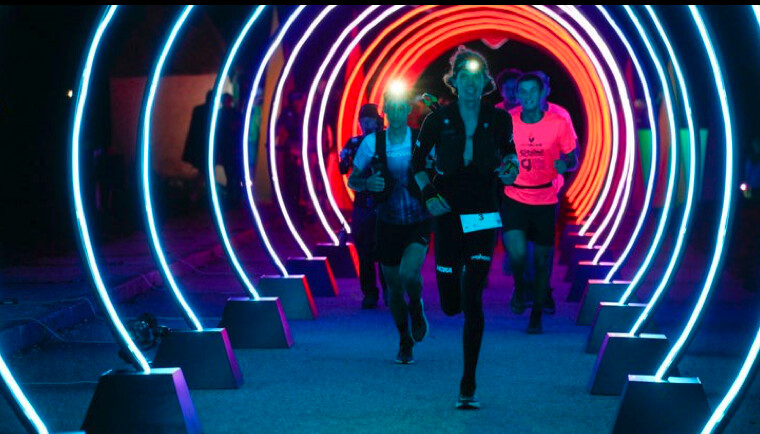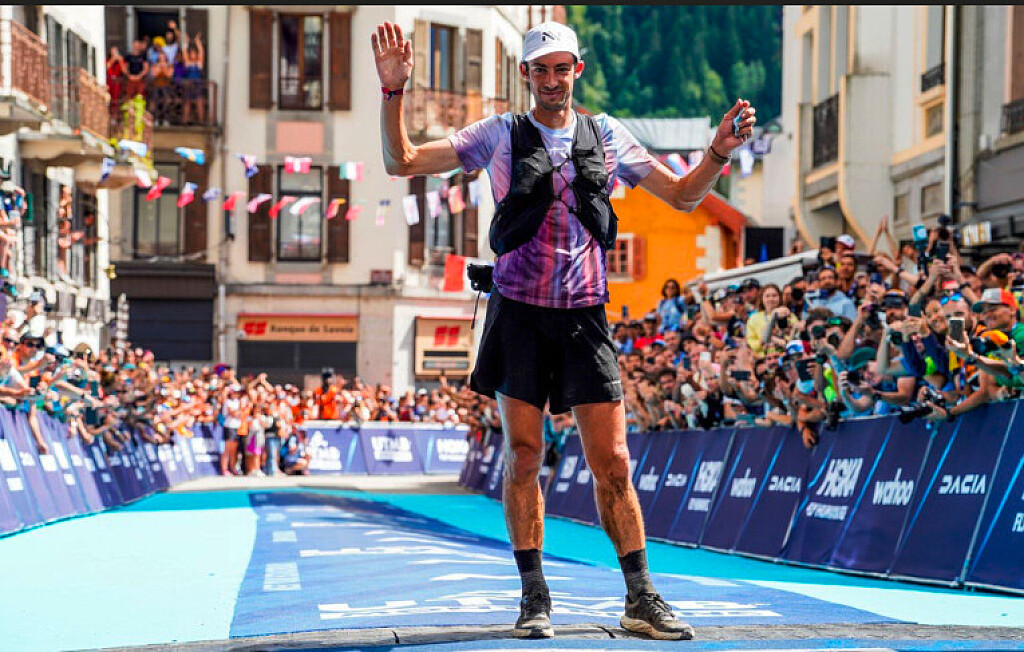Running News Daily
Running News Daily is edited by Bob Anderson. Send your news items to bob@mybestruns.com Advertising opportunities available. Train the Kenyan Way at KATA Kenya and Portugal owned and operated by Bob Anderson. Be sure to catch our movie A Long Run the movie KATA Running Camps and KATA Potato Farms - 31 now open in Kenya! https://kata.ke/
Index to Daily Posts · Sign Up For Updates · Run The World Feed
Kilian Jornet Isn't The G.O.A.T. of Trail Running Just Because He Wins Big Races
After Kilian Jornet won the Ultra-Trail du Mont-Blanc (UTMB) for a record-tying fourth time on August 27, it was easy to assume that running 100 miles is something that comes easy to him.
It doesn't, but it would be easy to think that because, well, it sure looked that way.


While the 34-year-old who hails from the Catalan region of Spain has long ago established himself as the G.O.A.T. of ultra-distance trail running in the mountains, he's as human as each of the other 2,300 runners who toed the line at this year's UTMB. Like his fellow competitors, Jornet felt fatigue in his legs from grinding through the 171.5km (106.5-mile) course and its 33,000 feet of elevation gain. He said he had difficulty breathing when he ran too fast or climbed too abruptly, likely the lingering effects of having just overcome Covid-19 earlier in the month.
And, like everyone else, he had to fight off low moments of mental torment, and maybe even a tiny trace of self-doubt-remember, he's human-as American rival Jim Walmsley opened up a big lead on him over the Grand Col Ferret as the course passed from Italy to Switzerland.
But what sets Jornet apart, and what has always distinguished him as an athlete, is a unique combination of physical ability, smart racing strategy and a deep connection to the mountains that allows him to move joyfully, patiently and, at times, seemingly with relative ease amid the physical anguish that comes with running such a grueling race.
But make no mistake, he suffered enroute to winning UTMB in a course-record 19 hours, 49 minutes, even if he made it look easy overcoming Walmsley and dispatching competent French contender Mathieu Blanchard.
"Since the start there has not been a single moment in which I didn't suffer," Jornet said after the race. "I knew that I needed to keep my intensity under a certain threshold where it can be heavy for the lungs, but it was no problem. But muscularly it was very hard from the start of the race."
Jornet is human, even if it took a debilitating illness to show it. But as he turned in yet another masterwork performance on the world's biggest stage, Jornet gave glimpses of what has made him so otherworldly for so long. Perhaps surprisingly, superior physicality is only a small part of it.Patience and Respect
Having already won UTMB three times and Hardrock a record-tying five times-most recently just six weeks earlier-Jornet had nothing to prove in Chamonix. In fact, if he had never toed the line or for that matter retires from competition, his legacy of epic race victories and Fastest Known Time (FKT) records on some of the most difficult trails and biggest mountains around the world would stand the test of time.
But that brings up another element that makes Jornet great is that he has always run as if he had nothing to prove. Sure, he's a competitive athlete, but his focus seems to be more about immersing in the zest of competition and the life-affirming bliss he's always felt in the mountains.
For Jornet, the destination truly is the journey, not the outcome. That adventure-oriented focus was something he learned in his youth growing up in the high-alpine environment of the Cap de Rec mountain refuge in the Spanish Pyrenees, where his dad was a mountain guide and his mom was a ski instructor. He climbed his first peak at age 3 and started competing in ski mountaineering races at 12.
Along the way, he developed a grounded sense of presence in the mountains that has allowed him to remain calm and bide his time in ultra-distance races-especially more rugged mountain races like UTMB and Hardrock. Instead of going all-out from the front, he typically follows a more fluid strategy of just staying in contact with the lead group and letting the race play out a bit as the terrain dictates before becoming hyper-competitive.
Contrast that to Walmsley, who has been hellbent on becoming the first American man to win the race with a front-running mentality, countryman Zach Miller, who returned after injuries and Covid-19 kept him away from continuing the same pursuit for three years, and the hard-charging Blanchard, who was eager to steal the show and make a name for himself in front of a supportive mostly French crowd after a robust third-place finish in 2021.
Even when Jornet was younger, he ran with maturity and wisdom beyond his years, always earnestly clinging to the premise that the experience of racing-and sharing it with his competitors, not to mention spectators and volunteers when possible-is always more important than the actual race itself.
When Walmsley built a big lead with a strong power-hiking surge up the Grand Col Ferret, Jornet was seemingly content, at that moment, to ease through the highest point of the course, chatting at times with volunteers, fans and videographers in French, Spanish or English as he had done at times earlier in the race. In previous UTMB races, he's burst ahead on the switchbacks up Grand Col Ferret and other steep climbs on that course, only to stop on top and wait for his competitors to catch up while gazing at the stars or picking mushrooms with children.
"At Hardrock this year, when I saw him on top of Grant Swamp Pass, he stopped in the middle of the race just to chat with me because we hadn't seen each other in a while," Miller says. "That's just the way Kilian is."A Versatile Mountain Athlete
Jornet has a much more diverse set of athletic skills and abilities than most ultrarunners. In addition to winning ultras, Jornet was a multiple world champion in ski mountaineering and SkyRunning in his twenties. He also set a host of new speed ascent marks and roundtrips on Mt. Kilimanjaro (Tanzania), Aconcagua (Argentina), Mont Blanc (France) and the Matterhorn (Switzerland). Although he missed in his attempt to set a new FKT on 29,032-foot Mt. Everest in 2017, he actually summited the world's highest mountain twice in six days without supplemental oxygen.
When he was a few years younger, he set a new record on the 171-mile Tahoe Rim Trail in California and Nevada and posted the fastest-ever time up the steep, rocky 1.3-mile Mt. Sanitas Trail in Boulder, Colorado.
"Kilian is a beast," says Francois D'Haene, the other four-time UTMB winner who last year became the first to win Hardrock and UTMB in the same summer. "When it comes to Vertical K races and distances from 40K to 100K, I think there is no competition between us. He's faster than me and stronger than me, especially on technical terrain."
Aside from long-and-rugged Hardrock and UTMB, Jornet won the shorter and much faster 42km Zegama Alpine Marathon in Spain and placed fourth in the 31km Sierre-Zinal village-to-village race in Switzerland in August. A lot of it has to do with the fact that he still trains in much of the same fashion as he did as a kid, often focusing more on fun, hard, playful days of adventure on foot or on skis as much as he does structured high-performance workouts.
"Kilian is unique in the range that he can cover," Miller says. "As a runner, his ability to switch back and forth from something like Zegama to Hardrock to Sierre-Zinal to UTMB is just incredible. And because of that ability, I think he's a bit of a mad scientist when it comes to training. He kind of turns himself into a guinea pig and trains in ways other guys might not be willing to for fear of overtraining."
All of that translated into Jornet's ability to win this year's UTMB despite trailing Walmsley by about 15 minutes at the 126km aid station at Champex. When the surging Blanchard caught him and quickly left the aid station, Jornet's competitiveness and mountain practicality started to fire up. They passed Walmsley and gapped him and then ran stride for stride over the ensuing 2,300-foot climb from the village of Trient down into the ski town of Valloricine.
Finally, after leaving the 153km aid station at the same moment as Blanchard, Jornet surged on a gently sloped 4km section of trail to the base of the final 2,600-foot climb up Tte aux Vents. Blanchard got a first-hand view of the master at work and all he could do was watch him run away to victory and hold on for second place.
"Running from Champex with Mathieu, I knew I was stronger going up but that he was catching on the downhills," said Jornet, who has lived in Norway for the past several years with his wife, Emelie Forsberg, and their two young children. "Once we got to Valloricine, the strategy was to push very hard up the final climb to Tte aux Vents and then manage the lead. I had about an 8-minute lead and I was feeling comfortable with it, but in a ultra race you never know, many things can happen."A Transcendent Athlete
At some point a conversation about Jornet should transcend trail running and include the similarities he shares with other great athletes who have had a similarly dominant presence in other sports. And yes, that means Tom Brady, Michael Jordan, Lindsay Vonn, Eddie Merckx, Michael Phelps, Ann Trason, Lynn Hill, Kelly Slater and Eliud Kipchoge.
Why not? Like each of those all-time athletes, Jornet has consistently risen to the occasion at the biggest moments of his career, not only because he physically outclasses the competition, but also because his intellectual prowess as an athlete and his ability to outthink, outwit and outlast them. It's not that he wins everything-although he's won the vast majority of his races since winning UTMB as a 20-year-old in 2008-it's more that he's been competing at the highest level for 15 years and hasn't regressed and has rarely had bad days.
In 2017, he had a rough go of it in the UTMB and finished second to D'Haene and in 2018 he dropped out after inflammation and pain caused by a pre-race bee sting made it difficult to keep running.
"Even his bad races he performs well, and I think that's what makes Kilian special," says Walmsley, who finished fourth at UTMB this year. "Whether it's a bad moment or a bad race, he's always still competing at a really high level. I have raced him twice at UTMB and both times I have thought I have found a crack, but I haven't been able to hold onto it."
Until recently, Jornet might have been viewed solely for his athletic. But with his bold move this year to break away from longtime sponsor Salomon and begin a new environmentally friendly trail running shoe brand called NNormal (with Spanish footwear brand Camper), he's not only begun to hone his entrepreneurial spirit in the world of business but also to make an impact as the environmental steward he's always been.
It's a path only a handful of high-level outdoor athletes achieved success at after making their mark in their sport disciplines, most notably Yvon Chouinard, a climber, surfer and kayaker who founded Patagonia in 1970.
Jornet ran all of his races this year in the same model of NNormal shoes that will be available at running shops and online this fall. It's a uniquely designed shoe that's balanced under the midfoot to promote midfoot and forefoot running gaits, but with enough cushioning to run with a heel-striking stride, especially on downhill sections of a trail. A thin polyurethane plate provides protection from rocks and some energy return, while a proprietary version of a Vibram Litebase Megagrip outsole serves up secure traction.
That all might sound pretty standard, but Jornet really wants his NNormal shoes to stand out for their durability. He and his colleagues have gone to great lengths to source long-lasting components, but they've also designed the shoe to be deconstructed so it will be easy to re-sole, repair or recycle it after hundreds of miles of wear and tear. It's all part of NNormal's No Trace philosophy that is all aimed at transparently designing gear with the smallest carbon footprint possible.
"There are a lot of good guys in the sport, but in [my] mind, Kilian is the king of the sport," says Miller, who was the fifth finisher at UTMB this year. "He sets the tone for the entire sport and [is] a great representative of the sport."
by Trail Runner Magazine
Login to leave a comment




